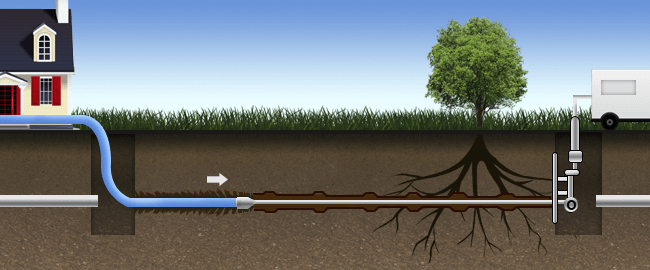Most homes have a main water line that brings water into the home. It usually consists of a private water service line that travels underground from your home to the main water supply in your city, town, or community. If your home relies on the main water line—and the vast majority of modern homes do— this main water line is responsible for bringing in all of the water that you use in your home. Will you ever need water line repair?
Without this main water line consistently bringing water into your home plumbing system, there would be no running water in your house. You would not be able to flush your toilets, take a shower, wash your hands or dishes in the sink, or use any appliances in your home that are dependent on water—including dishwashers, washing machines, etc.

Main Water Line Repair
The main water line that runs from your home to the water supply source in your area is extremely important. If there is a problem with your main water line that requires repair, it is best to find out about the issue as soon as possible so that you can get it fixed quickly without interruption to the running water in your home.
Many things can go wrong with your main water line—the most common problem is a water leak in the line—but, fortunately, there are multiple signs to watch out for that can let you know that your main water line might need to be repaired. Keep reading to discover five signs that your home needs a main water line repair.
1. Odd Puddles
Your main water line runs underground from your house to the main water supply source in your area. If your main water line springs a leak, the water that leaks from it can create puddles outside of your home.
If you notice puddles in your yard or water pooling around the foundation of your home, those could be signs that your main water line is leaking and you should call a professional plumber as soon as possible to diagnose and repair the problem.
2. High Water Bills
If you notice that your water bills are consistently much higher than they usually are, that is a red flag that there is a problem with your main water line. When there is a leak in your main water line, much of the water that flows through the main water line seeps out of the line and is lost at the point where the leak is located.
This water loss can lead to higher water bills because technically your household is “using” more water even if a good amount of that water never makes it into your home due to a leak in your main water line.
3. Low Water Pressure
Low water pressure is a sign that your main water line needs to be repaired, but it is a sign that is very commonly overlooked by homeowners. A leak or a blockage in your main water line can result in low water pressure because less water actually makes it into your home plumbing system—the rest of the water leaks out of the main water line or remains stuck behind the blockage in the main water line.
Because all of the water that flows into your home plumbing system flows through your main water line, leaking or blocked main water line should cause low water pressure all over your home. If you only notice low water pressure in one part of your home or from one faucet, the problem is probably unrelated to an issue with your main water line.
4. Noisy Pipes
Do you hear banging sounds coming from your pipes or gurgling sounds coming from your toilet—or any other strange sounds that seem to be coming from your home plumbing system?
Noisy pipes can be a sign of a problem with your main water line. A leak or a blockage in your main water line can cause strange sounds to be emitted from the pipes in your home. If you hear the same odd sounds all over your house, there’s a good chance that the problem with your pipes stems from an issue with your main water line as opposed to a different pipe.
5. Cloudy Water
Disintegrating pipes can cause the water that flows from the faucets in your home to appear cloudy or hazy. If you notice that the water in your home is cloudy when it comes out of your sinks, showers, etc., get your main water line checked for damage and disintegration.
Let us know if you need more help in deciding what to do about your main water line.


